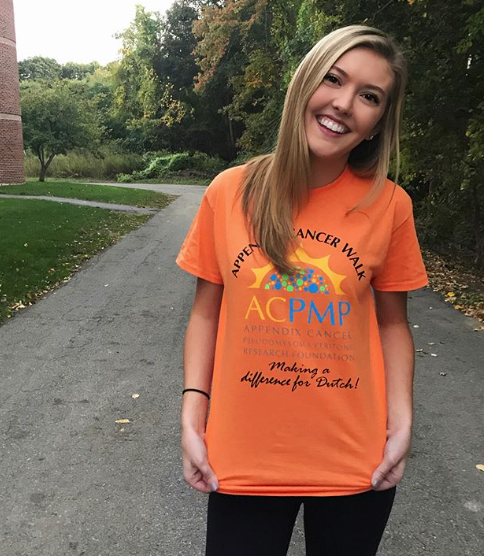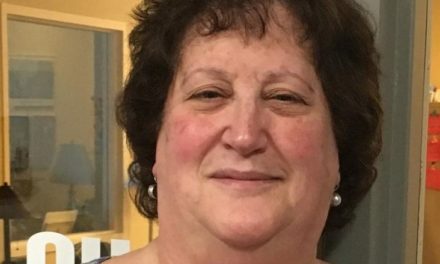My name is Lauren Smith, I’m 22 years old and I’m from Bedford New Hampshire. One year ago, before my senior year of college, I was given the news that nobody ever wants to hear, the news that turns your world upside down, I was told that I had cancer. Cancers and tumors of the appendix are extremely rare, it was once thought to be diagnosed in about 1,000 people worldwide each year. In other words, the lifetime odds of being diagnosed were thought to be about one in a million.
Recent research indicates that the incidence of appendix cancer may be as high as 10 people diagnosed per million per year. The number of reported cases has increased over the past decade, but it is not certain whether incidence of appendix cancer is actually increasing or the rate has changed due to likely misdiagnosis or misclassification in the past.The average age of onset is between 50 and 55 years.
Appendix cancer is cancer that starts in the cells lining the inside of the appendix. There are a number of different types of cancers of the appendix. The different types are associated with different behaviors and therefore the types of treatments that are offered. It very rarely is as simple as just removing the appendix, as more often than not, the tumor has had an opportunity to spread over years or has been misdiagnosed as something else. Appendix cancers are the most common cause of pseudomyxoma peritonei (or “PMP”). PMP is a rare condition characterized by the presence of mucin in the abdominal cavity. A number of types of tumors can cause PMP, but the most common cause is appendix cancer – including low-grade mucinous neoplasms of the appendix.
I was originally misdiagnosed by my appendectomy surgeon, being told I had a more aggressive tumor and that it was of high-grade. As she herself said in all her years had never seen an appendix tumor and knew nothing about them. I learned from specialists weeks later that the tumor of my appendix was a mucinous neoplasm instead, much more slow moving and low grade, LAMN for short. Had I not seen those two specialists, I would have been completely lost and misinformed. While this disease is so rare and specialists are limited, finding and meeting with a specialist and getting the right information is very important when diagnosed with appendix cancer and/or PMP.
Luckily, the specialists that I saw were hopeful that all of the afflicting mucin from my tumor was removed when my appendix was taken out and I have a low risk of a recurrence or of developing PMP.With that being said, the mucin had leeched to the outside of the appendix, so they will never know for sure and I will have to be scanned annually. As you can imagine, my family, friends, loved ones and I went through an emotional roller coaster with this event and were overwhelmed with the response of prayers and support that we had received… I can’t help but think that not only because of my young age and an early diagnosis, that I am so lucky to be able to avoid treatment procedures for now.
I learned quickly that appendix cancer and PMP is not listed or recognized by the American Cancer Society, Dana Farber or many other larger named cancer research centers. No funding is applied to appendix cancer; no money from Relay for Life is given to research or to those battling this cancer, and no articles to help those struggling for answers.
When I learned that very few organizations even recognize appendix cancer, I was upset and felt lost. However, I luckily found The Appendix Cancer / Pseudomyxoma Peritonei Research Foundation (ACPMPfor short), the only organization dedicated to funding research for appendix cancer and PMP. I quickly became very passionate about making their mission my mission and raised funds through social media on their behalf during the summer I was diagnosed. “ACPMP is dedicated to funding research to find a cure for Pseudomyxoma Peritonei (PMP), Appendix Cancer, and related Peritoneal Surface Malignancies (PSM), and to funding educational programs to educate physicians and patients about these diseases” (acpmp.org).
Educating others, the lack of readily available information, preventing misdiagnosis, and doing my best to raise funds towards research is what motivates me to be an advocate. Along with providing assistance, answers, and comfort to those newly diagnosed… I recall my family and I feeling extremely alone, lost, and scared, without much information or understanding… I never want for anyone to ever feel that way.
Success for me would be knowing that I tried to do something, at least once a day. Whether it be helping provide someone with answers, spreading awareness to appendix cancer and PMP, connecting a patient to a support group, educating someone new, or even just continuing ACPMP’s mission in one way or another.
I have grown as a rare disease advocate because one year following my diagnosis and story, I am proud to say that I have now taken on an official full-time role with the ACPMP Research Foundation as their Development and Communications Manager. I have been spared from treatment at this point in my life, but I know that not everyone affected by this rare disease is so lucky, so I hope to be an advocate for those that are currently fighting. Finding my passion for advocating and fundraising for appendix cancer and PMP has been truly an incredible experience. Yes, leading me here was challenging, but I would never change the final outcome.
I now have a greater sense of compassion, a more profound recognition of just how precious life is, and an understanding of what it is I am meant to do in this life– help others.
For more information please go to acpmp.org
Visit my personal fundraising page where 100% of the proceeds go directly to ACPMP https://acpmp.salsalabs.org/lauren/p/beatappendixcancer/index.html




